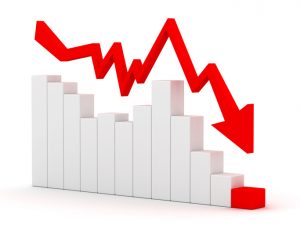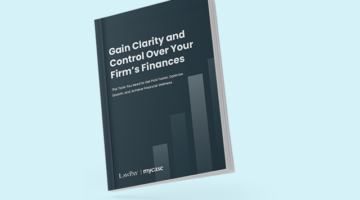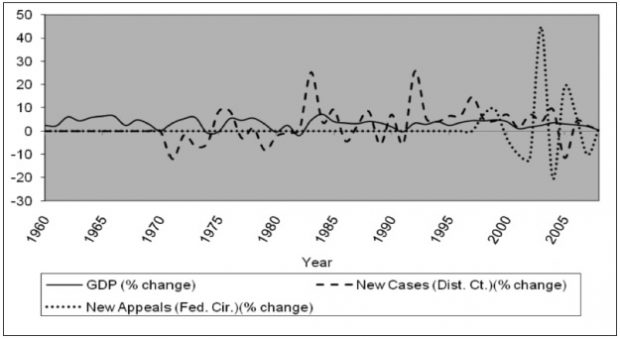 Does the health of the economy impact the legal business? This question is an important fundamental issue for lawyers and everyone in related businesses from expert witnesses to litigation funding companies. Despite its importance from a business standpoint, not many researchers have previously look at this question. Perhaps the best study done on the topic is the 2010 study “The State of the U.S. Economy and Patent Litigation Activity” by Brad Riel and Paul Meiklejohn. That study is specific to patent activity, but in independent research on behalf of investing clients, I have reached similar conclusions that relate to many, though not all, other areas of the law.
Does the health of the economy impact the legal business? This question is an important fundamental issue for lawyers and everyone in related businesses from expert witnesses to litigation funding companies. Despite its importance from a business standpoint, not many researchers have previously look at this question. Perhaps the best study done on the topic is the 2010 study “The State of the U.S. Economy and Patent Litigation Activity” by Brad Riel and Paul Meiklejohn. That study is specific to patent activity, but in independent research on behalf of investing clients, I have reached similar conclusions that relate to many, though not all, other areas of the law.
There are two plausible theories for how economic activity might be correlated with legal activity. First, it could be that litigation in economic recessions becomes comparatively less common. In recessions, outlays of cash are more expensive as individuals and corporate look to tighten their belts. As a result, legal participants may be less inclined to take on frivolous lawsuits that might result in an eventual payday. In other words, it is possible that only the most meritorious claims survive the litigation process in a recession. This is consistent with individuals becoming more risk-averse during recessions.
On the other hand, one might argue that cash-strapped companies and individuals, looking for any funding they can get, may pursue more litigation — especially if attorneys are willing to base a large portion of their fee on the eventual outcome of the case. Such contingent-fee arrangements would lower the risk associated with a lawsuit for many parties, thus making lawsuits more likely as individuals and companies become more risk-averse during recessions.

How MyCase Accounting Transforms Legal Bookkeeping
This complete system built for lawyers simplifies the complex world of law firm finance.
So which theory holds up?
In general, legal services activity (adjusted for time trends in the data) as a whole tends to closely track economic GDP growth, as the chart below shows. That is, legal activity as a whole tracks GDP, though with a significant lag. In particular, companies and individuals tend to raise more lawsuits after recessions end based on actions that occurred during the recession. This has important implications for a whole host of decisions made by legal industry participants.
New litigation cases are highly negatively correlated to the overall economy – but only at the district court level. Cases at the appellate court level show no significant correlation to the overall economy. Essentially this means that when the economy is good, there are fewer new cases filled in district courts. When the economy is bad, there are more cases filed. Riel and Meiklejohn found this relationship to be robust and consistent over time.

Take Control Of Your Firm’s Finances With Tools Built For Success
Position your firm for long-term growth with better financial visibility and control. Learn how to track performance, manage spending, and plan strategically—download the full e-book now.
On the whole then, interested parties should conclude that the state of the economy does have a significant and predictable impact on various legal businesses. This impact should drive some of the decisions made at firms. For instance, law firms should increase their ad budgets as soon as the economy begins to tank. This will enable the firms to garner recognition from customers looking to file new cases, as well as the clients who will file cases in a few months after the recession ends. (The average recession since 1950 has lasted about seven months.) Litigation funding firms should alter their investment policies based on the condition of the economy, and litigation support firms should consider changing their messaging during recessions in particular.
The economic cycle may be unpredictable, but it is persistent – recessions and expansions do not change on the drop of a dime – and that means that the legal business can take advantage of these trends by paying savvy attention to data.
Michael McDonald is an assistant professor of finance at Fairfield University in Connecticut. He holds a PhD in finance. Michael consults extensively with organizations ranging from Fortune 500 companies to start-up businesses on financial matters through Morning Investments Consulting. Michael has served as an expert witness in legal disputes, and is an arbitrator with the Financial Industry National Regulatory Authority (FINRA). Michael can be reached at [email protected].

